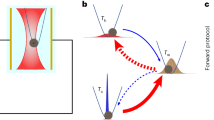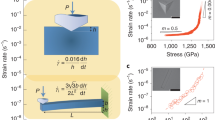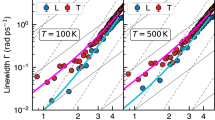Abstract
Albert Einstein's work on brownian motion showed how thermal equilibrium could be brought about by work exchanged through thermal fluctuations and viscous dissipation. Glasses are out-of-equilibrium systems in which this exchange happens at widely different timescales simultaneously. Theory then suggests the fascinating possibility that such behaviour may lead to a more general form of thermalization, in which the effective temperature shared by all components differs at each timescale.
This is a preview of subscription content, access via your institution
Access options
Subscribe to this journal
Receive 51 print issues and online access
$199.00 per year
only $3.90 per issue
Buy this article
- Purchase on Springer Link
- Instant access to full article PDF
Prices may be subject to local taxes which are calculated during checkout



Similar content being viewed by others
References
Kubo, R., Toda, M. & Hashitsume, N. Statistical Physics II: Nonequilibrium Statistical Mechanics (Springer, New York, 1991).
Sompolinsky, H. & Zippelius, A. Relaxational dynamics of the Edwards-Anderson model and the mean-field theory of spin-glasses. Phys. Rev. B 25, 6860–6875 (1982).
Cugliandolo, L. F. & Kurchan, J. On the out-of equilibrium relaxation of the Sherrington-Kirkpatrick model. J. Phys. A 27, 5749–5772 (1994).
Cugliandolo, L. F., Kurchan, J. & Peliti, L. Energy flow, partial equilibration, and effective temperatures in systems with slow dynamics. Phys. Rev. E 55, 3898–3914 (1997).
Berthier, L. & Barrat, J. -L. Nonequilibrium dynamics and fluctuation-dissipation in a sheared fluid. J. Chem. Phys. 116, 6228–6242 (2002).
Makse, H. A. & Kurchan, J. Testing the thermodynamic approach to granular matter with a numerical model of a decisive experiment. Nature 415, 614–617 (2002).
Israeloff, N. E. & Grigera, T. S. Low-frequency dielectric fluctuations near the glass transition. Europhys. Lett. 43, 308–313 (1998).
Buisson, L., Ciliberto, S. & Garcimartin, A. Intermittent origin of the large violations of the fluctuation-dissipation relations in an aging polymer glass. Europhys. Lett. 63, 603–609 (2003).
Herisson, D. & Ocio, M. Fluctuation-dissipation ratio of a spin glass in the aging regime. Phys. Rev. Lett. 88, 257202 (2002).
Tool, A. Q. Relation between inelastic deformability and thermal expansion of glass in its annealing range. J. Am. Ceram. Soc. 29, 240–253 (1946).
Edwards, S. F. in Granular Matter: An Interdisciplinary Approach (ed. Mehta, A.) 121–140 (Springer, New York, 1994).
Author information
Authors and Affiliations
Ethics declarations
Competing interests
The author declares no competing financial interests.
Rights and permissions
About this article
Cite this article
Kurchan, J. In and out of equilibrium. Nature 433, 222–225 (2005). https://doi.org/10.1038/nature03278
Published:
Issue Date:
DOI: https://doi.org/10.1038/nature03278
This article is cited by
-
Critical active dynamics is captured by a colored-noise driven field theory
Communications Physics (2022)
-
Membranes for bioethanol production by pervaporation
Biotechnology for Biofuels (2021)
-
Fluctuating hydrodynamics of chiral active fluids
Nature Physics (2021)
-
Holographic vitrification
Journal of High Energy Physics (2015)
-
Nanoscale Environment Sensing Scheme with Brownian Nanorod and Plasmon Resonator
Plasmonics (2014)
Comments
By submitting a comment you agree to abide by our Terms and Community Guidelines. If you find something abusive or that does not comply with our terms or guidelines please flag it as inappropriate.



